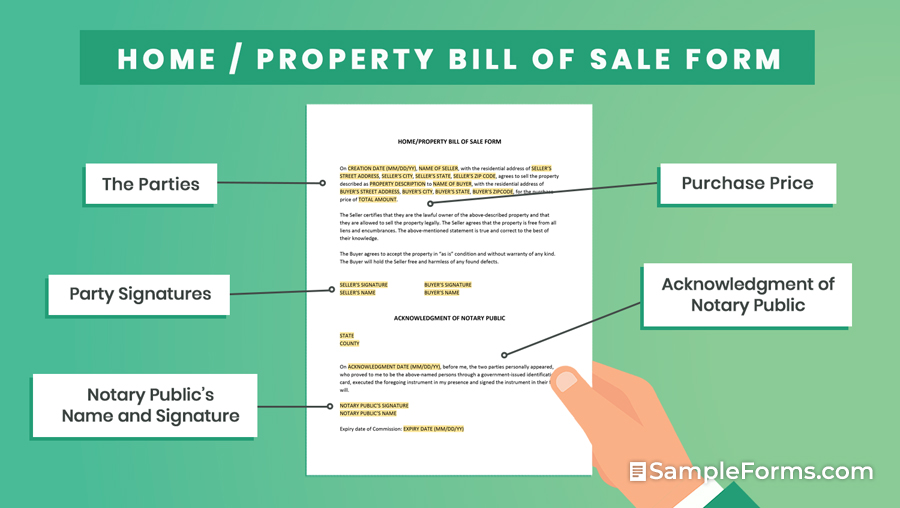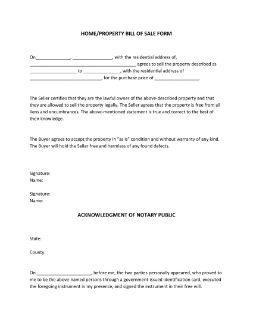- Eviction Notice Forms
- Power of Attorney Forms Forms
- Bill of Sale (Purchase Agreement) Forms
- Lease Agreement Forms
- Rental Application Forms
- Living Will Forms Forms
- Recommendation Letters Forms
- Resignation Letters Forms
- Release of Liability Agreement Forms
- Promissory Note Forms
- LLC Operating Agreement Forms
- Deed of Sale Forms
- Consent Form Forms
- Support Affidavit Forms
- Paternity Affidavit Forms
- Marital Affidavit Forms
- Financial Affidavit Forms
- Residential Affidavit Forms
- Affidavit of Identity Forms
- Affidavit of Title Forms
- Employment Affidavit Forms
- Affidavit of Loss Forms
- Gift Affidavit Forms
- Small Estate Affidavit Forms
- Service Affidavit Forms
- Heirship Affidavit Forms
- Survivorship Affidavit Forms
- Desistance Affidavit Forms
- Discrepancy Affidavit Forms
- Career Assessment - 16+ Examples, Format, Tips, Pdf Forms
- Undertaking Affidavit Forms
- General Affidavit Forms
- Affidavit of Death Forms
Home/Property Bill of Sale
Whether it’s for equipment or personal property, it’s wise to set and document clear terms between two parties. A home/property bill of sale is both a contract and a receipt—wherein both parties agree on a set of terms to avoid future disputes and is also used as evidence that a sale has taken place. Going through the process sounds like a hassle. However, a bill of sale brings a sense of security to the buyer. To get a brief background of this home/property bill of sale, continue reading below. Read More
What Is a Home/Property Bill of Sale Form?

A home/property bill of sale form is a legal document that is used to transfer ownership and to document a property sale between the buyer and the seller. This bill of sale composes of essential information such as the purchase price, property description, and buyer’s and seller’s personal information. Not all states require a bill of sale upon registration as much as some states require a notary acknowledgment.
About 44% of the initial home search is done online. Given that anyone has access to the internet nowadays, everything that you need can be found under one tap only. This method helps both the buyer and the seller save some time because the buyer can immediately come up with a decision through pictures if they want to purchase the property or not. Once the buyer approves of the images, then they can contact the seller for the showing of the property.
How Do You Write a Home/Property Bill of Sale Form?
One helpful tip to keep in mind is that bill of sale forms have no standard format—which means you can create them or downloaded online. If you have enough patience to spare, then read below about our tips on how to make your property bill of sale form.
1. Gather All Essential Information
Gather all the essential information such as the buyer’s and seller’s personal information, your property’s pricing, property description, and the terms and conditions. It’s nice to gather all the essential information first before to spot errors and to make the necessary corrections as early as possible.
Also, don’t forget to check if your state requires you a bill of sale because some states don’t.
2. Start Making Your Home/Property Bill of Sale
Before making your actual home/property bill of sale, look for sample formats that you can follow online—it will be harder to make one without a guide. But, if you belong to the states the require a notarized bill of sale, such as Louisiana, Maryland, Nebraska, New Hampshire, and West Virginia, it might be wise to download your form online. Fill out the form responsibly by using the essential information.
3. Price Accordingly
Home or properties that are on sale are usually expensive, to begin with. However, this should not give you a free pass to set the purchase price so high and take advantage of your prospective buyer. The purchase price should be relatively lower than the original price. For transparency, you may provide a breakdown of how you came up with such a price. Unreasonable pricing will drive your customers away.
4. Double-Check the Bill of Sale
A home/property bill of sale is a legally binding document—hence, inaccurate information on the bill of sale may deem it null and void—and that’s the last thing you want to happen. Double-check everything and, if possible, reread the document over and over again for possible errors that you might have unnoticed.
5. Sign the Document
Once everything has been accounted for, sign the document. It means that you have read, understood, and consented to the provisions of the bill of sale. The names of both parties should accompany the signatures.
6. Provide Two Copies
Once the document is signed, provide a copy for the buyer and the seller. This will be for both parties’ records.
Like what has been previously mentioned, this home/property bill of sale acts as a contract and a receipt. It protects both seller and buyer when it comes to disputes and is valid in the court of law. Whether it’s for commercial or residential use, home or property is one big investment, and you want to be assured that your money goes into the right pockets.
After all, what could be more depressing than settling then having everything taken away from you down the road?
Frequently Asked Questions
1. Are notarized bills of sale legally binding?
Yes, bills of sale are legal documents that can stand as a contract between the buyer and seller. The guidelines set in the bill of sale should be following the State laws wherein the sale or transaction is about to take place.
2. What do you usually include when selling home or property?
Usually, when selling home or property, fixtures and fittings are included. Unless these are explicitly stated, do not presume that these are included in the sale.
3. How does a bill of sale protect the buyer and the seller?
The bill of sale displays the responsibilities of both parties in the sale. That way, it is easier to point out who is not keeping their end of the agreement.
4. Who gets to keep the original copy of the bill of sale?
Both parties should keep a copy of the bill of sale for tax purposes and personal records.
5. How is the bill of sale effective for a buyer?
The bill of sale displays the condition of the car at the time of the sale. Should there be any damages to the home/property that the seller intentionally kept from you, the bill of sale will act as your proof. The bill of sale also serves as evidence that the home/property was sold to you.
